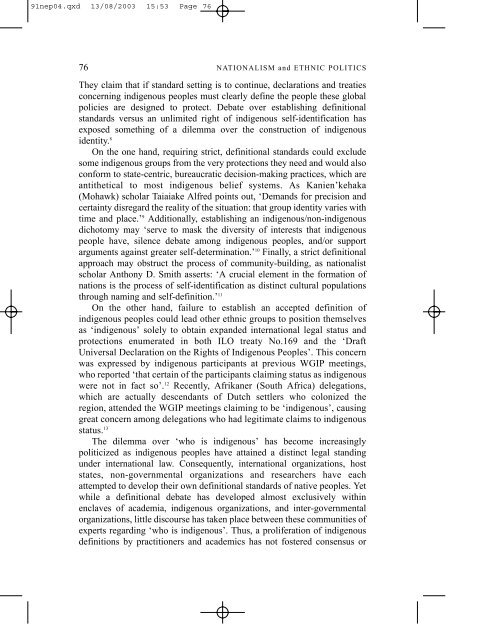Who is Indigenous? 'Peoplehood' and Ethnonationalist Approaches to Rearticulating Indigenous Identity
by Jeff J. Corntassel
by Jeff J. Corntassel
Create successful ePaper yourself
Turn your PDF publications into a flip-book with our unique Google optimized e-Paper software.
91nep04.qxd 13/08/2003 15:53 Page 76<br />
76 NATIONALISM <strong>and</strong> ETHNIC POLITICS<br />
They claim that if st<strong>and</strong>ard setting <strong>is</strong> <strong>to</strong> continue, declarations <strong>and</strong> treaties<br />
concerning indigenous peoples must clearly define the people these global<br />
policies are designed <strong>to</strong> protect. Debate over establ<strong>is</strong>hing definitional<br />
st<strong>and</strong>ards versus an unlimited right of indigenous self-identification has<br />
exposed something of a dilemma over the construction of indigenous<br />
identity. 8<br />
On the one h<strong>and</strong>, requiring strict, definitional st<strong>and</strong>ards could exclude<br />
some indigenous groups from the very protections they need <strong>and</strong> would also<br />
conform <strong>to</strong> state-centric, bureaucratic dec<strong>is</strong>ion-making practices, which are<br />
antithetical <strong>to</strong> most indigenous belief systems. As Kanien’kehaka<br />
(Mohawk) scholar Taiaiake Alfred points out, ‘Dem<strong>and</strong>s for prec<strong>is</strong>ion <strong>and</strong><br />
certainty d<strong>is</strong>regard the reality of the situation: that group identity varies with<br />
time <strong>and</strong> place.’ 9 Additionally, establ<strong>is</strong>hing an indigenous/non-indigenous<br />
dicho<strong>to</strong>my may ‘serve <strong>to</strong> mask the diversity of interests that indigenous<br />
people have, silence debate among indigenous peoples, <strong>and</strong>/or support<br />
arguments against greater self-determination.’ 10 inally, a strict definitional<br />
approach may obstruct the process of community-building, as national<strong>is</strong>t<br />
scholar Anthony D. Smith asserts: ‘A crucial element in the formation of<br />
nations <strong>is</strong> the process of self-identification as d<strong>is</strong>tinct cultural populations<br />
through naming <strong>and</strong> self-definition.’ 11<br />
On the other h<strong>and</strong>, failure <strong>to</strong> establ<strong>is</strong>h an accepted definition of<br />
indigenous peoples could lead other ethnic groups <strong>to</strong> position themselves<br />
as ‘indigenous’ solely <strong>to</strong> obtain exp<strong>and</strong>ed international legal status <strong>and</strong><br />
protections enumerated in both ILO treaty No.169 <strong>and</strong> the ‘Draft<br />
Universal Declaration on the Rights of <strong>Indigenous</strong> Peoples’. Th<strong>is</strong> concern<br />
was expressed by indigenous participants at previous WGIP meetings,<br />
who reported ‘that certain of the participants claiming status as indigenous<br />
were not in fact so’. 12 Recently, Afrikaner (South Africa) delegations,<br />
which are actually descendants of Dutch settlers who colonized the<br />
region, attended the WGIP meetings claiming <strong>to</strong> be ‘indigenous’, causing<br />
great concern among delegations who had legitimate claims <strong>to</strong> indigenous<br />
status. 13<br />
The dilemma over ‘who <strong>is</strong> indigenous’ has become increasingly<br />
politicized as indigenous peoples have attained a d<strong>is</strong>tinct legal st<strong>and</strong>ing<br />
under international law. Consequently, international organizations, host<br />
states, non-governmental organizations <strong>and</strong> researchers have each<br />
attempted <strong>to</strong> develop their own definitional st<strong>and</strong>ards of native peoples. Yet<br />
while a definitional debate has developed almost exclusively within<br />
enclaves of academia, indigenous organizations, <strong>and</strong> inter-governmental<br />
organizations, little d<strong>is</strong>course has taken place between these communities of<br />
experts regarding ‘who <strong>is</strong> indigenous’. Thus, a proliferation of indigenous<br />
definitions by practitioners <strong>and</strong> academics has not fostered consensus or


















